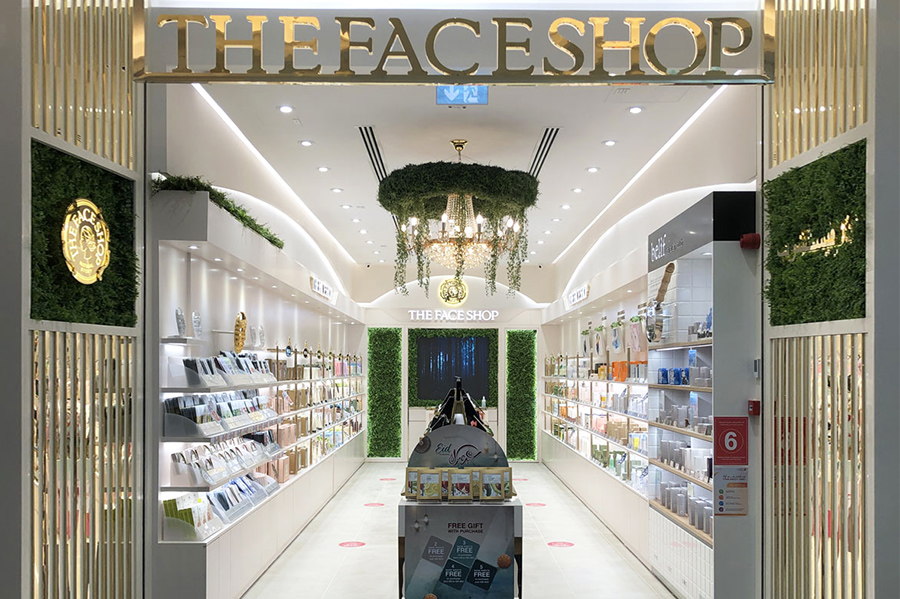
The Face Shop, Mall of the Emirates
It’s no exaggeration to say that Korean Beauty, known as “K-beauty” has changed the way we think about our skincare. Highly regarded for their quality ingredients and cutting-edge formula, K-beauty products from the East Asian country have become increasingly popular over the past few years. According to ResearchAndMarkets.com, the global K-beauty products market size was valued at $9.3 billion in 2018 and is projected to reach $21.8 billion by 2026, registering a CAGR of 11.3% from 2019 to 2026. Asia-Pacific is one of the prominent regions in the market that solely accounted for approximately 70% of the total K-beauty market share in 2019. When it comes to the GCC, Korea’s cosmetics exports to the Middle East hit $7.8 million in June, up from $7 million in June 2020 and $4.3 million in June 2019, according to Korean trade authorities. The region is still a small market compared to China, the US and Japan, but demand is growing fast.
A rise in awareness of the benefits and uniqueness of K-beauty products among consumers across the globe creates massive opportunities for expansion among the K-beauty products industry players. “Anyone who is serious about skincare have heard about K-beauty. Effectively combining technology with natural ingredients, Korean Beauty is slowly and steadily taking precedence over the global beauty market, including the Middle East,” said Anuradha Dhawan, the General Manager- Al Ghurair Retail- The Face Shop.
Launched in 2003 as Korea’s pioneer beauty brand, The Face Shop has a global presence in 35 countries including those in the Middle East, where it is managed and operated by Al Ghurair Retail. The brand has unveiled revamped concept stores in the UAE in prominent locations across the emirates —- totaling up to 20 concept stores in the region.
“The Middle East continues to be one of the strongest markets for beauty, skincare and fragrances and the market is estimated to grow to almost $40 million in the next 3 years. The region is definitely saturated with a lot of international and local brands catering to a diverse consumer base who like to experiment with new products. We cater to our customers’ appetite by launching carefully researched new products each year based on their needs,” stated Anuradha.
The fad of K-beauty products gained popularity worldwide, especially in East Asia, Southeast Asia, South Asia and the West, as a result of an increased focus on health, hydration and an emphasis for brightening effects. Ranging from hydrating essences to multitasking BB creams and the widely popular sheet masks, K-beauty has made a massive impact on the global beauty business in the last handful of years.“It’s more like preventive care for your skin and enables one to enhance the health of their skin and prevent skin issues, thereby maintaining a youthful complexion. It’s all about letting the skin’s natural glow shine through, rather than masking it with lashings of heavy products,” she said .
Customers turn to simple formulas due to sensitive skin – which is a big issue today – related to a stressful lifestyle, over-exfoliation and city pollution. “As Korea’s pioneer beauty company committed to nature, The Face Shop creates products from approximately 600 natural ingredients such as flowers, grains, plants, fruits, mineral water, and oriental medicine to nourish and revitalise the skin. Today, it is the most commercially successful and recognisable Korean brand with its famous tagline Natural Story.”
Last year, The Face Shop launched its e-commerce platform to cater to a larger customer base, whilst being present on other online marketplaces. With an omnichannel approach, the customers are offered an interactive and seamless experience in the physical stores as well as online. “Our products include body, bath, skin care and make-up aimed at both women and men. There is a shift in purchasing power. The increase in women’s employment has increased the purchasing power of our key customers, which are primarily women. Since natural ingredients are also a critical part of people’s current beauty regime, the Gen Z is quite keen to experiment with Korean beauty products. And seeing the popularity, many K-Beauty brands are mushrooming the region,” added Anuradha.
The K-pop industry has played a critical role in the widespread popularity of the Korean culture, food, and cosmetic products. K- Beauty is the K-pop of the cosmetics industry and as the various bands and artists continue to become popular, the K-beauty industry continues to ride on the “Hallyu” wave. “The demand for Korean beauty in the region has only grown over the past couple of years. “As market leaders in the GCC region we plan to become more available to our customers in the years to come, being present both in the retail space with new stores and new distribution channels being added. The introduction of our own e-commerce channel is in line with that plan to offer quick and easy shipping to our customers for their favorite products,” she concluded.
Notifications